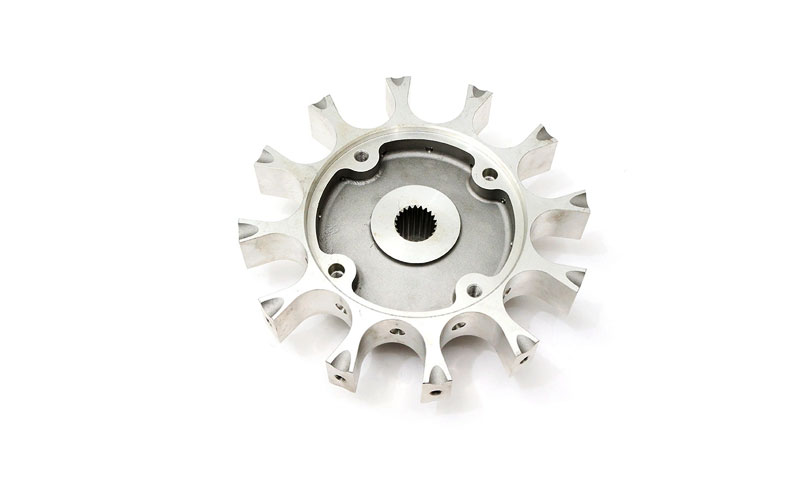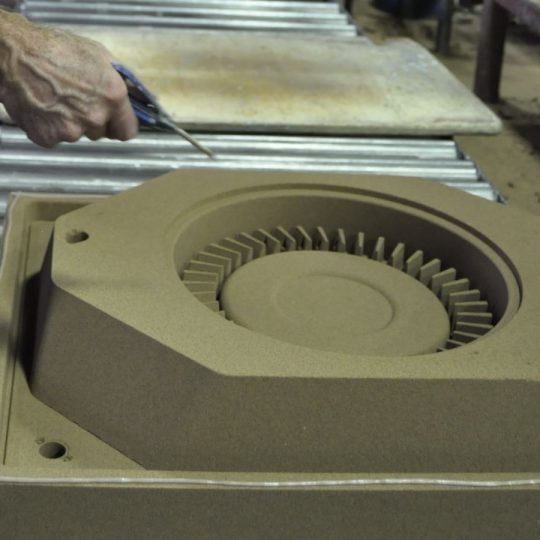The Future of Precision aluminum casting Technology
Discover the Advantages of Aluminum Casting in Modern Production
Aluminum casting has emerged as a pivotal procedure in contemporary production. Its lightweight yet durable nature offers substantial advantages for different sectors. The ability to accomplish complex designs and keep tight tolerances contributes to its charm. Precision aluminum casting. In addition, the cost-effectiveness and environmental advantages make it a sustainable option. As manufacturers look for innovative services, the role of aluminum casting proceeds to progress. What certain applications and advantages await exploration in this dynamic field?
Lightweight Yet Strong: The Benefits of Aluminum
Lots of materials are used in manufacturing, aluminum stands out due to its amazing combination of light-weight buildings and remarkable toughness. This one-of-a-kind quality makes aluminum an optimal option for numerous applications, particularly in sectors such as vehicle, aerospace, and construction. Its reduced density permits simpler handling and transport, contributing to reduced power intake during manufacturing and assembly processes.
Furthermore, aluminum's strength-to-weight ratio goes over, allowing makers to develop sturdy elements without including unnecessary mass. This particular is especially important in markets where weight reduction can lead to boosted fuel efficiency and total performance. Furthermore, aluminum's resistance to corrosion improves the longevity of products, additionally solidifying its charm in modern-day manufacturing.
Inevitably, the lightweight yet solid nature of aluminum placements it as a favored material, cultivating innovation and efficiency across multiple industries. Suppliers increasingly identify that these benefits can bring about significant advancements in layout and functionality.
Precision and Complexity in Style
As makers welcome the capacities of aluminum casting, they uncover new avenues for precision and complexity in design. This manufacturing procedure enables the production of detailed forms and detailed features that traditional methods commonly struggle to achieve. The fluidness of liquified aluminum allows it to fill intricate mold and mildews, resulting in components with tight tolerances and fine surface finishes.
This precision is especially valuable in industries such as aerospace and automotive, where exact specifications are important for performance and security. Aluminum casting likewise fits innovative designs that enhance functionality without compromising architectural honesty.

Cost-Effectiveness and Effectiveness
Cost-effectiveness and effectiveness are vital considerations for suppliers exploring aluminum casting as a manufacturing method. Aluminum casting deals significant price advantages because of its lower product costs contrasted to various other steels (aluminum casting). The light-weight nature of aluminum lowers shipping and handling expenses, and its exceptional thermal conductivity permits quicker cooling times throughout the casting process, boosting total production speed
Furthermore, aluminum's adaptability allows makers to produce complicated forms and designs, reducing the demand for added machining or setting up. This streamlining of production not just minimizes labor prices yet additionally reduces preparations, permitting companies to react quickly to market demands.
The toughness and rust resistance of aluminum castings add to longer product lifespans, lowering replacement costs over time. Because of this, manufacturers can achieve a balance of high-quality output and reduced functional expenditures, making aluminum casting a significantly eye-catching choice in modern-day manufacturing.
Environmental Sustainability of Aluminum Casting
Aluminum casting attracts attention as an ecologically lasting manufacturing alternative, especially as a result of its recyclability and decreased eco-friendly footprint. The process enables the efficient use aluminum, a product that can be recycled forever without shedding its residential properties. This characteristic considerably reduces the demand for virgin aluminum, therefore decreasing and saving natural sources energy usage associated with extraction and processing.

Applications Across Industries: From Automotive to Aerospace
While varied industries remain to look for ingenious materials for production, aluminum casting has proven to be a functional option across fields such as vehicle and aerospace. In the automobile sector, aluminum castings contribute to light-weight automobile designs, boosting fuel effectiveness and performance. Elements like engine blocks, transmission real estates, and wheels take advantage of aluminum's strength-to-weight proportion.
Likewise, in aerospace, aluminum casting plays a considerable function in creating complicated parts that require high resilience and low weight. Airplane elements such as brackets, touchdown equipment, and structural frameworks use aluminum for peak performance and safety.
The versatility of aluminum casting allows it to provide to other markets, consisting of consumer electronic devices, marine, and commercial machinery. This versatility not just satisfies the certain requirements of different applications yet likewise supports continuous technology in manufacturing processes. Because of this, aluminum casting remains a principal in contemporary production across countless markets.
Frequently Asked Inquiries
How Does Aluminum Casting Contrast to Other Steel Casting Procedures?
Aluminum casting deals premium strength-to-weight proportions, faster air conditioning prices, and excellent corrosion resistance compared to other metal casting procedures. These advantages make it ideal for numerous applications, improving efficiency and performance in production.
What Are the Common Lead Times for Aluminum Casting Projects?
Regular lead times for aluminum casting jobs vary from two to 8 weeks, depending upon factors such like this as complexity, order dimension, and manufacturing capacity. Effective preparation can aid reduce hold-ups and boost project timelines.
Can Aluminum Casting Be Utilized for Intricate Styles?
Aluminum casting can indeed accommodate complex designs. Precision aluminum casting. Its fluidness enables for thorough patterns and forms, making it ideal for intricate elements in various industries. This convenience enhances design liberty while preserving architectural stability and performance
What Post-Processing Options Are Offered After Aluminum Casting?
Post-processing alternatives for aluminum casting consist of machining, brightening, surface area therapies, anodizing, and welding. These strategies boost the coating, boost continue reading this dimensional accuracy, and increase corrosion resistance, thereby optimizing the final product's performance and aesthetic appeal.
How Do Temperature Modifications Affect Aluminum Casting Top Quality?
Temperature adjustments significantly impact aluminum casting high quality by affecting fluidness, solidification rates, and prospective flaws. Rapid air conditioning can lead to boosted brittleness, while excessive warm may trigger bending or incomplete dental filling of mold and mildews during casting.
Aluminum casting has actually emerged as a critical procedure in modern production. As manufacturers accept the abilities of aluminum casting, they discover brand-new opportunities for precision and complexity in design. Aluminum casting procedures commonly create less greenhouse gas discharges compared to other steel casting techniques. While diverse industries continue to look for cutting-edge materials for production, aluminum casting has actually proven to be a flexible option throughout sectors such webpage as auto and aerospace. In the vehicle market, aluminum castings add to lightweight lorry designs, enhancing fuel efficiency and performance.